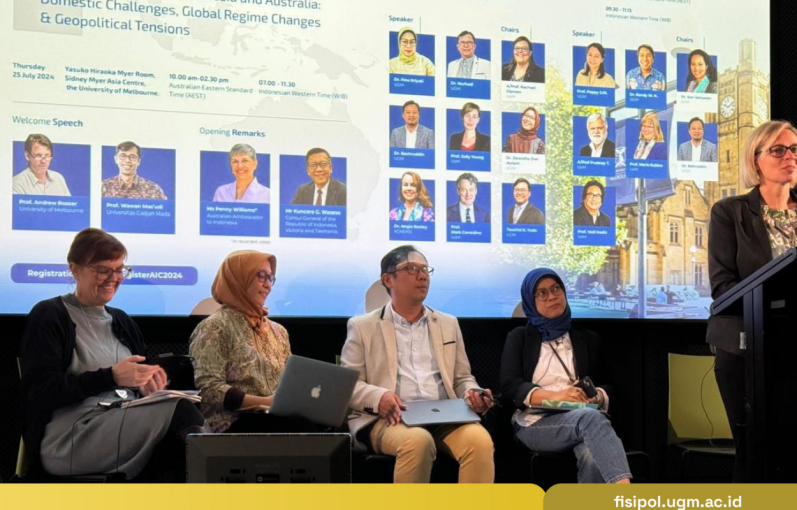
Australia, 25th of July 2024—This year, Indonesia is in the middle of preparing itself to form a new government under the leadership of Prabowo Subianto. A change in leadership at this moment will of course have significant impacts, not only on Indonesia’s domestic affairs, but also on its relations with other countries, including Australia. This topic became one of the main focus of discussion in the Fourth Conference of the Australia-Indonesia in Conversation (AIC), titled “The New Governments in Indonesia and Australia: Domestic Challenges, Global Regime Changes and Geopolitical Tensions.” This topic was discussed in particular at the First Discussion Panel titled “New Governments: Domestic Challenges and Bilateral Relations, which was held in hybrid mode at the Yasuko Hiraoka Room, Sidney Myer Asia Centre, at the University of Melbourne on Thursday (25/7).
Data from the World Bank shows that Indonesia is experiencing trends of economic growth from year to year, excluding the pandemic period. Siswo Pramono, the Ambassador for the Republic of Indonesia to Australia, mentioned that the economic stability achieved by the previous leadership in the last two periods must be both preserved and strengthened by the upcoming leadership.
“The task of the new president is to continue to stimulate economic growth, in order to avoid the threat of Indonesia falling into the middle income trap,” mentioned Siswo.
One of the ways to stimulate economic growth itself is to strengthen the bilateral relationship between Indonesia and other countries, and this includes Australia. In this regard, Siswo said that at least 6 of the 10 priorities of the Australian Southeast Economic Strategy 2040 program correlates with its Indonesian counterpart’s new president’s programs. The correlating sectors include nutrition and food security, public health, education, downstream industry and energy transition, infrastructure, and state revenue. Responding to these similarities, the Embassy of the Republic of Indonesia has designed many cooperation programs between both Australia and Indonesia from the year of 2024 until 2025.
Also present at the conference as speakers were Nurhadi, Vice Dean of Finance, Asset, and Human Resources Affairs of UGM’s Faculty of Social Science and Political Science; Mark Considine, Professor of Political Science at the University of Melbourne; Sally Young, Professor of Australian Politics and Media at the University of Melbourne; Fina Itriyati, Vice Dean of Collaboration, Alumni and Research Affairs of UGM’s Faculty of Social Science and Political Science; and Angie Bexley, representative of the Knowledge Partnership Platform Australia-Indonesia (KONEKSI). The ongoing collaboration between the Faculty of Social Science and Political Science of UGM and the Faculty of Arts of the University of Melbourne is a sign of the faculty commitments to commit to the UN Sustainable Development Goals, in particular SDG 17 Partnership for the Goals.
